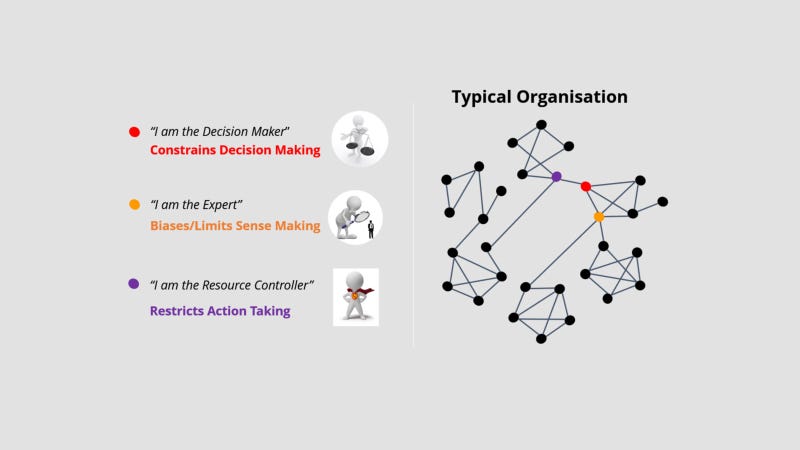“Now, ordinary people are born forwards in Time, if you understand what I mean, and nearly everything in the world goes forward too... But I unfortunately was born at the wrong end of time and I have to live backwards from in front, while surrounded by a lot of people living forwards from behind”. — Merlin the wizard1
In The Once and Future King, Merlin the wizard explains that he lives in reverse time.
Having been born in the future, he ages backwards into the past, so has already seen what awaits the rest of us.
As a thought experiment, let’s take a leaf out of Merlin’s book and see if we can weave a little magic of our own…
Imagine a future state where the organisation you work in is a flourishing, vibrant community of people naturally cooperating and collaborating, doing great work together.
Everyone recognises, and lives by, the truism that none of us is as smart as all of us.
People learn with and from each other to co-create new value in new ways.
This results in continuous flourishing of people, organisation, and society.
Mutual respect is a cultural norm, and people enjoy a strong sense of autonomy, competence, and relatedness. 2
Sense making, decision making, and action taking are naturally and easily joined-up, iterated, embedded and distributed throughout the whole organisation.
The resulting culture of innovation, agility, and adaptiveness takes in its stride the twists and turns of an increasingly uncertain and unpredictable world.
Then something strange happens...
A weird curse begins distorting people’s perception.
It induces a form of self-deception in which individuals mistake their partial, biased, one-sided, “2D” perspectives as the only valid, right, and proper way to see things.3
This understandably alienates colleagues who see things differently — resulting in frustration, irritation, and misalignment.
The forces of misalignment begin to fracture and fragment the organisation. People coalesce into cliques within which everyone shares the same narrow, one-sided 2D perspective, and where anyone who questions the status quo runs the risk of ostracism and, eventually, excommunication…
The resulting fiefdoms, factions, and silos become increasingly insular, and, as people retreat further into their respective bunkers, they progressively lob accusations, then hand grenades, then cruise missiles at each other.
Communication shifts towards email — because why would “we” want to leave our bunker and risk encountering “them” face to face? 4
The energy and vitality of the past gives way to boundary battles, blame-slinging, and backside-covering.
Long emails begin to circulate, copied to everyone who’s anyone, stuffed with claims to the effect that “mistakes were made but not by me”.
Dialogue is gradually displaced by discussion and debate. 5
Camaraderie and cooperation give way to antagonism and alienation.
Shared sense making, effective decision making, and purposeful action taking collectively atrophy.
The previous sense of community coherence is replaced by transactional relationships tied down by formal agreements that rarely last long, despite the increasingly interminable meetings required to produce them.
Unresolved issues fester until they can no longer be ignored, then require urgent action — any action, so it looks like we’re at least doing something.
As a consequence, when action does get taken, it’s poorly thought-through with little attention paid to unintended but largely predictable side-effects.
Problems smoulder until they burst into flames.
Fire-fighting becomes the norm.
Some individuals are celebrated as heroes for their high-visibility antics, rushing around putting out fires.
Few notice that many of the fires occurred because those high-profile heroes failed to deal with problems when they first appeared.
Even fewer recognise that some of the fires were actually started by the heroes themselves — as a means of attracting attention to, and plaudits for, their seeming heroism…
Being a fire-fighting arsonist becomes an attractive path to career ascendance…
Well, here we are…
The point we’ve arrived back at via the Merlin Manoeuvre is a fairly succinct summary of lived reality in many organisations today.
But here’s the good news — the reverse journey doesn’t require magical powers.
It’s not only eminently possible, it’s enormously liberating — unblocking, unlocking, and unleashing the true value-creation capacity of the organisation and everyone within it.
It just involves creating conditions for emergence of a future-fit culture of innovation, agility, and adaptiveness…
Creating Conditions for Emergence
“The most destructive idea in existence: I am greater than you; you are less than me. This is the source of all human misery”. – Tyson Yunkaporta
Ready to take action?
My website provides a range of free resources to help you make the shift for yourselves, by yourselves, from “organisation as machine to be designed and operated” to “organisation as human community for shaping its future by creating continuous new value”.
Contact me to keynote at your next leadership conference or executive retreat, book one of my popular 90-minute "pick Geoff’s brains" sessions for senior executives, or tailor a custom coaching package for your development as a future-fit culture catalyst.
The Once and Future King by T. H. White (Originally published in 1958 and at p36 in the 2010 Harper Collins e-book ISBN:978-0-007-37556-1. White introduced the idea that Merlin lived through time backwards — a concept absent from earlier sources, such as Monmouth’s Historia Regum Britanniae (c. 1136) and Malory’s Le Morte d'Arthur (c. 1485).
When satisfied, these three innate psychological needs: competence, autonomy, and relatedness yield enhanced self-motivation and mental health. When thwarted they lead to diminished motivation and well-being. See “Self-Determination Theory and the Facilitation of Intrinsic Motivation, Social Development, and Well-Being” by Richard M. Ryan and Edward L. Deci, University of Rochester, NY, USA — in American Psychologist, January 2000 (p68). These were unfortunately “adapted” by writer Dan Pink in his book Drive. For why this was unfortunate, see this previous video post.
Find out more about 2D perspectives and 2D3D mindsets in this previous article.
For more on Debate and Discussion - or Dialogue see this previous article.





